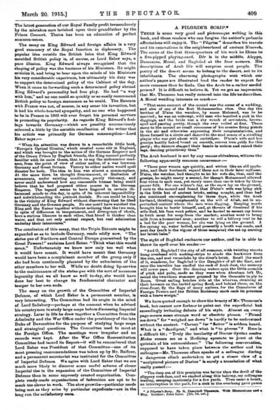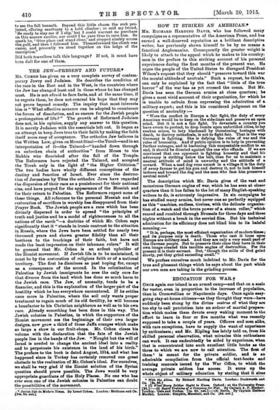A PILGRIM'S SCRIP.•
Team is some very good and picturesque writing in this book, and those readers who can forgive the author's peilautic affectations will enjoy it The "Pilgrim" describes his travels sod his excavations in the neighbourhood of ancient Nineveh. The scene of the first three-quarters of his work he likens to a five-pipped playing-card. Der is in the middle, Aleppo, Damascus, Mosul, and Baghdad at the four corners. His descriptions of Arab life will surprise most people. The poetry of the desert amens to belong to the desert, not to its inhabitants. The charming photographs with which our author's pages are illustrated lead the reader to expect far more romance than he finds. Can the Arab he a rat her sordid person P It le difficult to believe it. Yet we get an impresaiou that Mr. Thomson has really entered into the life be describes. A Mosul wedding interests us much o-- " That same summit of the mound was the scene of a wedding, and also of one of the first Moharnmeriati rites. One day the brother of Waite the watcher, by moue hfahreed, was to he married; he was en contempt, will man who handled a pick in tho diggings, and the bride was a shy wench of seventeen, brown- . eyed and passing pretty, though she ever veiled at first. There mime to the mound no small commune of his cronies firing pistols in the air and otherwise expreeaing their conirratuiations, and these formed i.13 a circle and danced to the said music of a strolling player who was girt about with cartridges. D'ainie wife and her gossips hastily baked bread us smooth, convex iron grids for thin party ; the dancers 'slapped their hands is unison and raised their legs. dancing primitively thee' The Arab buaband is not by any means chivalrous, witness the following apparently common occurrence:— These poor women age quickly, and wither like an old apple- John, and their husbands regard them not m their later ugliness. Within, the watcher, had thought to let him wife die, that, said the guseipe, be might marry a second, for though Mohammed allowed four wives to each MUM, yet rarely more than one is taken by thee. poorer folk. For one winter's day, as the some lay on the ground, I rode to the mound and found that Weiner. wife was lying sick in the little but of ancient bricks, eating oeught, and thee had abe erriatieued uncomplaining for three days, while the Arab huidainit„ thinking complacently on the will of Allah. eat in un- perturbed content where the men were digging. Reaping words brought him to bestir himself, sod, at threats of dismissal if his wife died, his face went yellow, and he basest to rentrut my home to fetch meat for soup from the market. another treat to bring milk from a homestead maw; another to roll a billowy tent to be a bed for the poor woman, for she was lying on the ground. A fire sprang up, water boiled, and preeeotly is broth was smile, and next day (such its the vigour of theme /acquits.) she eat up nursing her latest balm."
The sight of Baghdad enchants our anther, and he is able to throw its spell over his reader:— "And 0, Baghdad ! the city of all romance, with twisting streets hung overhead with eackingwierips to shade the berketers from the sun, and coal verandahs by the river's brink. Smell the smell of it, wanderer, for Baghdad is the Daughter of all the East, and once the traveller has snuffed the reek of Arab dust, the memory will never pass. Over the dancing waters spin the little coracles of pitch and pahn, made as they were when Abraham loft Ur, round the two-three steamers granted by the Oaluanlis to ply to Basra. Great sailing ketches ride at the wharves. straining M. their hawser. on the turbid spring flood, and bellied these, on the river-frout, fly the flags of many nations. for the Considatre of Foreign Powers and the British Residency mark each its presence with a brave ensign.'
We have quoted enoneb to show the beauty of M r. Thomson's book, lint cannot now forte.er to point out the superficial but exceedingly irritating defects of his style. Almost on every page occurs some strange word or obsolete phrase. Peieed madmen" for " weighed me down" is hardly to be understood without the context. "Carney" for "latter"' is seldom heard. What is a "dandiprat," and what Is "to Owes*" P Here is a difficult bit: "Truly the insularity of Doctor Gyntax contra Melee rouses me as a lledizing apostate to joust at the quintain of his outrermidance." The following conversation, supposed to have taken place between the author and his colleague—Mr. Thomson often speaks of a colleague during a dangerous climb undertaken to got is Moser view of a "sculptured picture of Darius" is surely a tranelation of what. really passed "The deep sea of this precipice was better than the devil of tIts slippery rock-face, and we started slaw this leilcrely, say colleague Marling, creeping cautiously for a few yards Then came a break, an interruption in the path, for a sick in the overhang gave pause • A Pderfeet Boer- By 8 Campbell TINewm With Illeatratime sae a Av. London John Lane. Ells. ed. natj to see the fan beneath. Beyond this little chasm the rock pro- jected, offering sanctuary to a bold climber ; so said my friend, 'Be ready to stay mo if I slip,' but I could warrant no purchase on this narrow escalier, nor could I be pare thus to save him. So Troth he, Give place and stand clear,' and stopped nimbly across the gulf, and then I followed him. 'Thenceforward the climb was easier, and presently we stood together on the ledge of the inscription."
Did both travellers talk this language P If not, it must bare been dull for one of them.







































 Previous page
Previous page